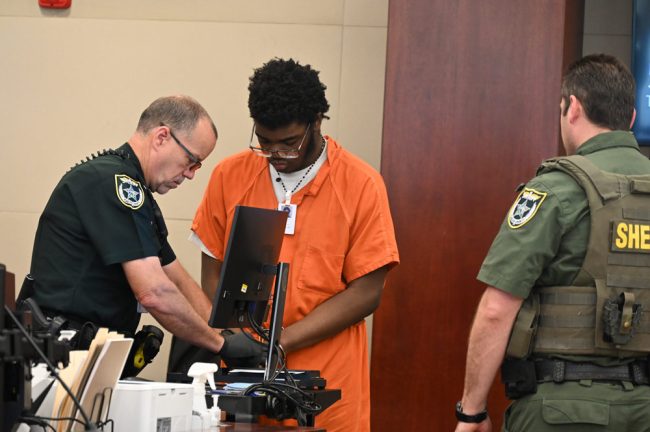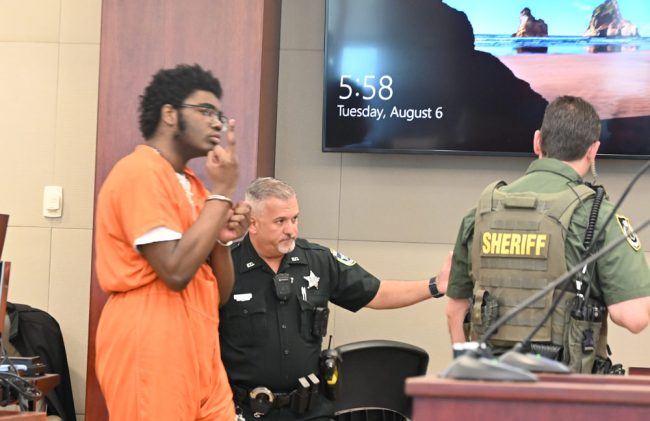
Answering the appeal of Brendant Depa’s conviction to five years in prison and 15 years on probation for assaulting his teacher’s aide at Matanzas High School in February 2023, the Attorney General’s Office in a 25-page brief argued that Circuit Judge Terence Perkins did not abuse his discretion when he imposed an adult sentence in August 2024, as the defense argued in its appeal.
Depa will be 20 in August. He had already served 25 months of his sentence in local jails by the time he was sentenced–time credited to his prison sentence–and has since served an additional 10 months of a 60-month sentence, though at the 51-month mark (in a year and four months) he may be eligible got gain time, or early release from prison for good behavior. His 15-year probation sentence would then begin. His defense team aims to relieve him of that long burden, too, not just abbreviate his prison stint.
Assistant Attorney General Kaylee Tatman’s May 23 brief filed at the Fifth District Court of Appeal doesn’t dispute the facts of the case as presented by the defense or detailed before Perkins in a two-day sentencing hearing. (Perkins has since retired.) Rather, the brief re-emphasizes the more traumatic aspects of the testimony heard at the hearing, including Depa’s brutality during the assault and his contempt after it, to argue that the sentence is deserved. And it reasserts the prison system’s capability to treat his disorders, based on the testimony of two witnesses who spoke at length during the hearing.
The brief, in sum, is more of a restatement of the sentencing hearing rather than a refutation of the appeal.
The prison system, referred to as the Department of Corrections, “can treat mental disorders, intellectual disabilities, or neurodevelopmental disorders, including autism,” the state’s answer brief states. “When asked whether DOC could treat [Depa], who had been diagnosed with autism, oppositional defiant disorder, ADHD, intermittent explosive disorder, disruptive mood dysregulation disorder, anxiety, and depression, Dr. [Suzonne] Kline asserted that DOC could treat [Depa] Six to eight months before a sentence ends, they start programming to maximize the inmate’s chance of a successful transition.”
The brief summarizes the testimony of Joann Naydich, the teacher aide, who spoke of the severe life-altering injuries she suffered, and it describes how Depa pit at her before the assault and hurled insults at her afterward, when he was being led away from her after the beating as she lay unconscious in a Matanzas High School hallway, attended by staff. “When asked about the altercation with the victim,” the brief states, Depa “externalized the blame by blaming it on the victim’s behavior.”
The brief goes on, frequently–if not mostly–echoing the defense’s appeal brief but for the more scabrous details of the incident and a greater emphasis on the prosecution’s exopert witness, Gregory Pritchard, a licensed psychologist, downplaying the severity of Depa’s autism and describing him as intelligent, knowing and aware of his actions.
In her argument, Tatman said the court had all the discretion to impose a sentence anywhere from the lowest permissible and the maximum. Depa faced up to 30 years in prison for the aggravated battery on a school employee, But he could also have faced as little as probation, without prison time, had the judge sentenced him as a juvenile, and what prison sanctions he may have faced could have been limited to until he turned 21, with no probation afterward. He could also have been sentenced as a youthful offender, which would have limited his prison and probation time.
“The nature of the event was extremely violent and aggressive,” Tatman argued, “resulting in the victim suffering five broken ribs (two of them were broken twice), a concussion, permanent hearing loss, permanent vision loss, vestibular problems, rotator cuff issues, and a herniated disc, as well as mental trauma. This was not an isolated incident.” The brief noted Depa’s prior history of two misdemeanor batteries and aggressive behavior, making him too “dangerous” to end sanctions when he turns 21.
Depa had pleaded to the offense in hopes of mitigating the severity of the sentence. He had not been sentenced as a youthful offender previously, leaving it in Perkins’s discretion to do so. Perkins agreed that he qualified. But he said it was not “appropriate” because the attack was too violent. The attack was recorded on video surveillance cameras, because it took place outside of classrooms.
Footage was disseminated to media and quickly circled the globe, heightening public interest (and outrage) but also–like Depa’s size and color: he is Black, his victim was white–almost unquestionably influencing the trajectory of the case, starting with the State Attorney’s decision to charge Depa as an adult. Court hearings drew large audiences and continued media attention.
Violence against teachers and school staff is endemic. Similar cases, including in Flagler County, have wended their way through the court with less severe sanctions (including a case where a student broke a staffer’s arm at Flagler Palm Coast High School several years ago and never saw a courtroom), usually for lack of video evidence and public glare. So Depa’s fate may have been sealed well before the sentencing hearing, though Depa at times did not help his case: after the sentencing hearing, he flipped off the gallery as he was being ushered out of the courtroom.

“The trial court did not abuse its discretion in imposing adult sanctions for [Depa’s] violent and aggressive attack on the victim,” the brief argues, “especially where the court directed that [Depa] receive mental health services both while incarcerated and on probation. [Depa] is entitled to no relief.”
There had been little question, however, that mental health services likely more rigorous and dignified than those he would receive in prison would have been part of his regimen outside of prison. “While [Depa] could voluntarily choose to receive treatment after he turned 21 and was released from [the Department of Juvenile Justice], there would be no authority that he did so.”
Nor will there be once probation runs its course.
The appeal court has not scheduled oral arguments in the case and may rule on a schedule entirely at its discretion.
![]()





























Mike says
If she was unconscious, how she know he hurled insults while being led away ???
FlaglerLive says
The insults were on video and heard by the two dozen people around the scene as he was led away.
Pogo says
@So, perjury, is now legal:
“…The prison system, referred to as the Department of Corrections, “can treat mental disorders, intellectual disabilities, or neurodevelopmental disorders, including autism,” the state’s answer brief states…”
§ Definition
https://www.google.com/search?q=perjury
§ Sources
https://www.google.com/search?q=9th+commandment
Atwp says
I thought a young white lady attacked an adult. Her sentence is lighter I thought. Interesting!
Pig Farmer says
“resulting in the victim suffering five broken ribs (two of them were broken twice), a concussion, permanent hearing loss, permanent vision loss, vestibular problems, rotator cuff issues, and a herniated disc, as well as mental trauma. This was not an isolated incident.” The brief noted Depa’s prior history of two misdemeanor batteries and aggressive behavior, making him too “dangerous” to end sanctions when he turns 21.”
Yep, he was only convicted because he is black.
/s
Steve says
I guess he thiught Alk in the Gallery were number one #1. It just shows Why hes in the position he is. IMO wont be the ladt we hear from Brendon
Jf says
Are you freaking joking right now? It’s not about race. White or black he’s lucky that’s all he got! I am sick and tired of the race card being tossed out. When was the last time Benjamin Crump took the side of a white police officer shot dead by another race? Look at the stats you will be amazed. Just go to the officer down memorial page and see first hand where the problem is.
Robjr says
@Pig Farmer says
“Yep, he was only convicted because he is black.”
No. Not the conviction, just the inequitable sentence.
https://flaglerlive.com/deputys-son-jayden-jackson-23-sentenced-to-5-years-in-prison-for-hit-and-run-death-of-shaunta-cain/
Jayden Jackson, the 23-year-old resident of Daytona North facing a first-degree felony hit-and-run charge in the death of Shaunta Cain, 54, on U.S. 1 almost three years ago, was sentenced to five years in state prison followed by five years on probation, plus restitution and other requirements.
Jayden Jackson says
If kid had money or was white it would be a 1000 percent different outcome for him. Murikkka where justice is based on money and skin color!
Concerned Citizen says
Where is the sympathy for the victim?
William Stonehocker says
Let me just set the record straight and say that while I can sympathize with the victim for what happened, she was not a good fit for Brendan due to her lack of experience and shouldn’t have been assigned to work with him. ECHO says their clients go to public school, but they should’ve known Brendan was a horrible fit for one.
Barbara Buchanan was not at the trial and neither were the rest of Brendan’s family outside his mom…what a coward!
Daisy says
Im from family of teachers and tutors.I have tremendous respect for the profession.Unfortunately the victim wasn’t properly trained in assisting special needs students.If she was,she would have de-escalated the situation instead of confronting the student.Brendan is severely autistic and was also on a cocktail of medications.I also know a few people who are within the austism spectrum and it takes a certain type of individual to be able to care for an autistic individual.
Daisy says
Does anyone have any updates on Brendan?Is his special needs teacher still visiting him to help him with his education? Is he safe?Thank you for any updates.
Ben says
Who cares? hes an animal. But im sure hes busy plotting his next violent crime.